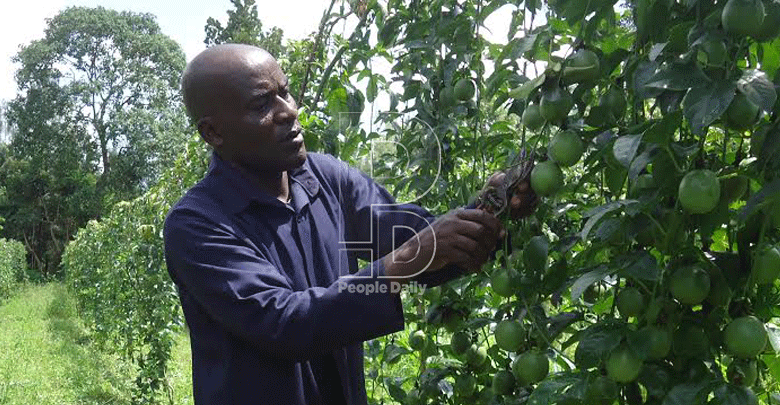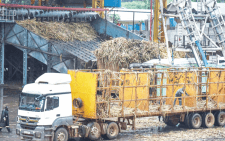Passionate about passion fruit farming

When Samson Ochieng left his job at a fruit farm in Kiambu county as a technical instructor, he did not know that he would successfully start and run his own orchard back home in Migori county, today, he rakes a fortune out of growing the tropical vine.
A dusty murram road off the Kisii-Isebania highway leads to Samson Ochieng’s fruit farm in Migori county.
Ochieng is among the few farmers in the cross-border county who have discovered the secret to fruit farming as a commercial agribusiness.
Agribiz recently visited his farm located at God-jope area in Suna East Sub-County where he took us through his success journey.
“My journey in farming traces back in 2010 when we were trained by Anglican Development Service (ADS) on the benefits of passion fruit farming.
My farm was used for demonstration and since then I developed passion for the venture,” he recalls.
In an area predominantly known for sugarcane and tobacco growing as cash crops, Ochieng surprised many when he took a different path of fruitfarming.
Armed with Sh18,000 as start-up capital, the farmer dived into the venture with enthusiasm and purposely to make direct income.
He began by trying his hands on mango and avacado farming, but his big financial breakthrough came when he introduced passion fruits.
“For the start, I planted an eighth of an acre of the juicy fruit through traditional production methods before upgrading to improved agricultural farming concept following the advise of experts at various organised farmers trainings,” says Ochieng, who also formerly worked as a technical instructor at a fruit farm in Thika, Kiambu county until the 1990s.
Strange disease setback
Boasting of vast experience in fruits matters, Ochieng developed aspirations to advance fruit growing locally, which saw him cascade the idea to a group of six like-minded farmers whom they pioneered Manywa Fruit Growers and Processing self help group together in 2011 where they slowly introduced members to the venture.
Nearly 50 members recruited to the group embraced the agribusiness to supplement their income.
Months later, the farmers got major setback after a strange disease hit their plants at the early stages of growth, leaving them devastated.
“Our first attempt in growing the fruit was disastrous as pests, the likes of aphids and diseases, such as wilt wiped off the plants at flowering stage.
We were left counting huge loses as a result,” recounts Ochieng.
Owing to the unpredictable challenges that came along the way, many farmers got discouraged and dropped the venture.
Those who braved the challenge later picked up, replanted and this time round they begun raking in profits from the fruits sale.
Ochieng says they realised a turnaround after learning the secrets to containing destructive diseases that had previously ravaged their plants.
“We got relevant tips from agricultural experts on how to deal with the issue of fruit diseases, which solved our problem,” he states.
Consequently , a number of farmers jetted back to the venture with vigour and and determination and once again, started recording profits as Ochieng expanded his production to half an acre.
His orchard currently has over 200 passion fruit plants and specialises in the purple species of the fruit, which he grafts on top of the yellow variety for better yields.
A grafted passion fruit seedling takes between six and seven months to start flowering before reaching fruit stage for eventual harvesting, which starts in the seventh and ninth month from planting.
He plants the seedlings six metres apart and two metres between rows. “I use nine-foot treated eucalyptus poles to guard against termites and rot.
The poles are placed after every two plants and are strewn with galvanised barbed wire on top, which is used as runners by passion trees,” explains Ochieng.
The climber fruit harvesting is done on a weekly basis for nine months every year for three years.
On average Ochieng harvests 20 kilogrammes of passion fruits every week, which retails at Sh80 in the local market. Averagely, he takes home Sh240,000 in profits every production year.
Other members of Manywa group now produce between 10 kilogrammes and 15 kilogrammes of passion fruit every week.
He attributes his mastery of growing the fruits to the many agricultural trainings and farmers field visits he attends from time to time and his farm continues to act as a demonstration centre for the group farmers, after which the farmers replicate the skills on their various farms.
He urges local farmers to diversify into fruit farming particularly passion fruit production in order to tap into the ready market.
He says the group has started a processing component as part of value addition initiative as it eyes more profits.
For Ochieng, growing passion fruits is advantageous for reasons, such as its less labour intensive nature, takes little duration of growth and has guaranteed market locally.
Further, he says passion fruits offer an avenue to best improve nutritional needs of families.
“There is a considerable high demand for passion fruit locally because not so many farmers have discovered the hidden opportunity in this area,” he explains.
Ochieng notes that their low production volumes has limited chances of meeting demand particularly in instances where clients place big orders.
The farmer’s dream is to further expand on his production to meet the growing market demand.
He points at diseases that attack passion fruit plants and irregular change in weather patterns as key challenges.













